Archives
2nd Kyoto University-Inamori Foundation Joint Kyoto Prize Symposium
July 11-12, 2015

Executive Chair
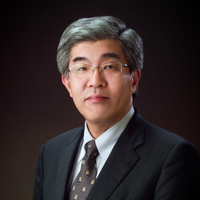
Norihiro Tokitoh
Professor & Director, Institute for Chemical Research, Kyoto University
- Web Site URL
- http://boc.kuicr.kyoto-u.ac.jp/www/tokitoh/index_e.html
- A brief Biography
-
Norihiro Tokitoh is a professor of chemistry at the Institute for Chemical Research (ICR), Kyoto University. He received his Ph. D. (1985) from the University of Tokyo. After spending some years as Research Associate (1986) and then Assistant Professor (1987) of Tsukuba Univ., and Assistant Professor (1989) and then Associate Professor (1994) of The University of Tokyo, he was appointed as Professor of the Institute for Fundamental Organic Chemistry, Kyushu Univ. in 1998 and moved to ICR, Kyoto University in 2000. He served as Guest Professor at Institute for Molecular Science (2001-2003), Technische Universität Braunschweig (2004-2007), and Universität Bonn (2013-), and Director of ICR (2008-2012, 2014-).
- Details of selected Awards and Honors
-
His main research interest is focused on novel bonding and structures in heavier main group element chemistry. He received Incentive Award in Synthetic Organic Chemistry, Japan (1992), Progress Award in Silicon Chemistry, Japan (1996), Japan IBM Science Award (1998), Chemical Society of Japan Award for Creative Work (2003), Alexander von Humboldt Research Award (2003), Lectureship Award of National Science Council, Republic of China (2007), Kim Yong Hae Lectureship Award of KAIST, Korea (2010), BCSJ Awards (2002, 2005, 2007, 2009, 2010, and 2013), Best Reviewer Commendation (JSPS; 2010), and Re-invitation by AvH Research Award (2013). He contributed to several chemistry journals, such as Journal of Physical Organic Chemistry (Associate Editor for Asia, 1998-2006), Organometallics (Advisory Board Member, 2006-2009), Journal of Sulfur Chemistry (Editorial Board Member, 2001-), Main Group Metal Chemistry (Editorial Board Member, 2011-) and Bulletin of the Chemical Society of Japan (Editor-in-chief, 2013-).
- A list of selected Publications
-
1) Synthesis and Characterization of a Stable Dibismuthene: Evidence for a Bi-Bi Double Bond, Tokitoh, N.; Arai, Y.; Okazaki, R.; Nagase, S. Science, 1997, 277, 78-80.
2) A Stable Neutral Silaaromatic Compound, 2-{2,4,6-Tris[bis(trimethylsilyl)methyl]phenyl}-2-silanaphthalene, Tokitoh, N.; Wakita, K.; Okazaki, R.; Nagase, S.; Schleyer, P. v. R.; Jiao, H. J. J. Am. Chem. Soc. 1997, 119, 6951-6952.
3) New Progress in the Chemistry of Stable Metallaaromatic Compounds of Heavier Group 14 Elements, Tokitoh, N. Acc. Chem. Res. 2004, 37, 86-94.
4) Synthesis and Reactions of a Stable 1,2-Diaryl-1,2-dibromodisilene: A Precursor for Substituted Disilenes and a 1,2-Diaryldisilyne, Sasamori, T.; Hironaka, K. ; Sugiyama, Y.; Takagi, N.; Nagase, S.; Hosoi, Y. ; Furukawa, Y.; Tokitoh, N. J. Am. Chem. Soc. 2008, 130, 13856-13857.
5) Stable Heavier Carbene Analogues, Mizuhata, Y.; Sasamori, T.; Tokitoh, N. Chem. Rev. 2009, 109, 3479-351.
Program Chair for the Category of Advanced Technology
Program Chair for the Field of Electronics
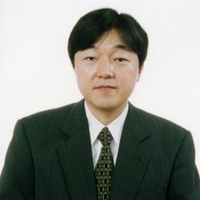
Susumu Noda
Professor, Graduate School of Engineering, Kyoto University
- Web Site URL
- http://www.qoe.kuee.kyoto-u.ac.jp/e/index.php?FrontPage
- A brief Biography
- Professor Susumu Noda received B.S., M.S., and Ph.D. degrees from Kyoto University, Kyoto, Japan, in 1982, 1984, and 1991, respectively, all in electronics. In 2006, he has received an honorary degree from Gent University, Gent, Belgium. From 1984 to 1988, he was with the Mitsubishi Electric Corporation, and he joined Kyoto University in 1988. Currently he is a full Professor with the Department of Electronic Science and Engineering and a director of Photonics and Electronics Science and Engineering Center (PESEC), Kyoto University. His research interest covers physics and applications of photonic and quantum nanostructures including photonic crystals and quantum dots.
- Details of selected Awards and Honors
- He received several awards including the IBM Science Award (2000), the Japan Society of Applied Physics Achievement Award on Quantum Electronics (2005), and OSA Joseph Fraunhofer Award/Robert M. Burley Prize (2006), IEEE Fellow (2008), IEEE Nanotechnology Pioneering Award (2009), Reo Esaki Awards (2009), Medal with Purple Ribbon (2014) and the 15th Japan Society of Applied Physics Outstanding Achievement Award (2015).
- A list of selected Publications
-
・Noda, et al., “Trapping and emission of photons by a single defect in a photonic bandgap structure”, Nature, vol. 407, No. 6804, pp.608-610 (OCT 5 2000)
・Noda, et al., “Full three-dimensional photonic bandgap crystals at near-infrared wavelengths”, Science, vol.289 No. 5479, pp. 604-606 (JUL 28 2000)
・Imada, Noda, et al., “Coherent two-dimensional lasing action in surface-emitting laser with triangular-lattice photonic crystal structure”, Appl. Phys. Lett., vol.75, No.3, pp. 316-318 (JUL 19 1999).
・Akahane, Noda, et al., “High-Q photonic nanocavity in a two-dimensional photonic crystal”, Nature, vol. 425, No. 6961, pp. 944-947 (OCT 30 2003).
・Hirose, Noda, et al, “Watt-class high-power, high-beam-quality photonic-crystal lasers”, Nature Photonics, vol.8, No.5, pp. 406-411(May 2014).
and over 410 other publications
Total citation: over 13,500
Program Chair for the Category of Basic Sciences
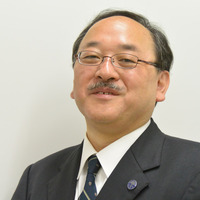
Atsushi Moriwaki
Dean & Professor, Graduate School of Science, Kyoto University
- A brief Biography
-
1986 – 1995 Research Assistant of Kyoto University 1992 – 1995 Assistant Professor of UCLA 1995 – 2003 Associate Professor of Kyoto University 2003 – Professor of Kyoto University 2008 – 2009 Vice-Dean of Graduate School of Science, Kyoto University 2010 – 2014 Assistant to the Executive Vice-President 2014 – 2015 Vice-President 2015 – Dean of Graduate School of Science, Kyoto University - Details of selected Awards and Honors
-
2001 2001 Japanese Mathematical Society’s Fall Prize - A list of selected Publications
-
● Papers
[1] Inequality of Bogomolov-Gieseker type on arithmetic surfaces. Duke Math. J. 74 (1994), no. 3, 713-761.
[2] Geometric height inequality on varieties with ample cotangent bundles. J. Algebraic Geom. 4 (1995), no. 2, 385-396.
[3] Remarks on rational points of varieties whose cotangent bundles are generated by global sections. Math. Res. Lett. 2 (1995), no. 1, 113-118.
[4] Arithmetic Bogomolov-Gieseker’s inequality. Amer. J. Math. 117 (1995), no. 5, 1325-1347.
[5] Relative Bogomolov’s inequality and the cone of positive divisors on the moduli space of stable curves. J. Amer. Math. Soc. 11 (1998), no. 3, 569-600.
[6] The continuity of Deligne’s pairing. Internat. Math. Res. Notices 1999, no. 19, 1057-1066.
[7] Arithmetic height functions over finitely generated fields. Invent. Math. 140 (2000), no. 1, 101-142.
[8] A generalization of conjectures of Bogomolov and Lang over finitely generated fields. Duke Math. J. 107 (2001), no. 1, 85-102.
[9] The Q-Picard group of the moduli space of curves in positive characteristic. Internat. J. Math. 12 (2001), no. 5, 519-534.
[10] Continuity of volumes on arithmetic varieties. J. of Algebraic geometry 18 (2009), 407-457.
[11] Big arithmetic divisors on the projective spaces over Z. Kyoto J. of Math., 51 (2011), 503-534.
[12] Zariski decompositions on arithmetic surfaces, Publ. RIMS Kyoto Univ., 48 (2012), 799-898. (DOI) 10.2977/PRIMS/89.
[13] Toward Dirichlet’s unit theorem on arithmetic varieties, Kyoto J. of Math., 53 (2013), 197-259. (DOI) 10.1215/21562261-1966116.
[14] Semiample invertible sheaves with semipositive continuous hermitian metrics, to appear in Algebra and Number Theory, (arXiv:1409.8533 [math.AG]).
● Books
[15] Arakelov geometry. Translations of Mathematical Monographs, vol 244, (2014), American Mathematical Society.
Program Chair for the Field of Biological Sciences
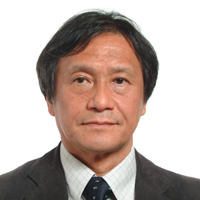
Shiro Kohshima
Director, Professor, Wildlife Research Center, Kyoto University
- Web Site URL
- http://www.wrc.kyoto-u.ac.jp/en/members/kohshima.html
- A brief Biography
-
1985 Ph. D in Graduate School of Science, Kyoto University 1985 – 1988 Research Fellow, JSPS 1988 – 1990 Research Fellow, Department of Science, Kyoto University 1990 – 2008 Associate Professor of Tokyo Institute of Technology 2008 – Professor, Wildlife Research Center of Kyoto University 2008 – Director, Wildlife Research Center of Kyoto University - A list of selected Publications
-
1.Kohshima, S. (1984): Novel cold-tolerant insect found in a Himalayan glacier. Nature, 310, 225-227.
2.Hiromi Kobayashi and Shiro Kohshima (1997): Unique Morphology of the Human Eye. Nature Vol. 387, No 6635, pp767-768.
3.Yoshimura, Y., Kohshima, S., Takeuchi, N., Y., Seko and Fujita, K. (2000):Himalayan ice core dating with snow algae. Journal of Glaciology, Vol.46, No.153, 335-340
4.Kobayashi, H. and Kohshima, S. (2001): Unique morphology of the human eye and its adaptive meaning: comparative studies on external morphology of the primate eye. Journal of Human Evolution 40, 419-435.
5.Matsubayasi, H., Bosi, E. & Kohshima, S. (2002): Activity and habitat use of lesser mouse deer (Tragulus javanicus). Journal of Mammalogy, Vol.84, No.1, pp.234-242.
6.Kuze, N., T.I.Malim, and Kohshima, S. (2005): Developmental change of the face-morphology in Borneo Orangutan, American Journal of Primatology, 65, 353-376.
7.Sekiguchi, Y., Arai, K., Kohshima, S. (2006): Sleep in continuously active dolphins. Nature, Vol. 441, E9-10.
8.Sakai, M., Hishii, T., Takeda, S. and Kohshima, S. (2006): Laterality of flipper rubbing behaviour in wild bottlenose dolphins (Tursiops aduncus): Caused by asymmetry of eye use? Behavioural Brain Research ,170, 204-210.
9.Kobayashi S, Asai T , Fujimoto Y, Kohshima S. (2008) Anti-herbivore structures of Paulownia tomentosa: morphology, distribution, chemical constituents, and changes during shoot and leaf development. Annals of Botany 101 (7): 1035-1047.
10.Ikeda, T., Kohshima, S. (2009) Why is the neon tetra so bright? Coloration for mirror-image projection to confuse predators? “Mirror-image decoy” hypothesis. Environmental Biology of Fishes 86:3, 427-441.
11.Sasaki-Yamamoto Y, Akamatsu T, Ura T, Sugimatsu H, Kojima J, Bahl R, Behera S, Kohshima S (2013) Diel changes in the movement patterns of Ganges River dolphins monitored using stationed stereo acoustic data loggers. Marine Mammal Science 10/2013; 29(4).
12.Ueda S, Kumagai G, Otaki Y, Yamaguchi S, Kohshima S (2014) A Comparison of Facial Color Pattern and Gazing Behavior in Canid Species Suggests Gaze Communication in Gray Wolves (Canis lupus). PLoS ONE 06/2014; 9(6):e98217.
13.Yoshida Y, Morisaka T, Sakai M, Iwasaki M, Wakabayashi I, Seko A, Kasamatsu M, Akamatsu T, Kohshima S (2014) Sound variation and function in captive Commerson’s dolphins (Cephalorhyncus commersonii) Behavioural Processes 09/2014; DOI: 10.1016/j.beproc.2014.08.017
14.Uetake J, Tanaka S, Hara K, Tanabe Y, Samyn D, Motoyama H, Imura S, Kohshima S (2014) Novel biogenic aggregation of moss gemmae on a disappearing African glacier. PLoS ONE 11/2014; 9(11):e112510.
15.Murakami T, Segawa T, Bodington D, Dial R, Takeuchi N, Kohshima S, Hongoh Y (2015) Census of bacterial microbiota associated with the glacier ice worm Mesenchytraeus solifugus. FEMS Microbiology Ecology, 01/2015; DOI: 10.1093/femsec/fiv003
Program Co-Chair for the Field of Biological Sciences
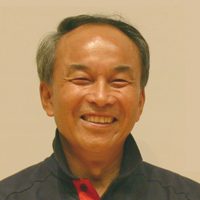
Kiyokazu Agata
Professor, Graduate School of Science, Kyoto University
- Web Site URL
- http://mdb.biophys.kyoto-u.ac.jp/index_E.html
- A brief Biography
-
1979 B.Sci. Kyoto University 1985 D.Sci. Kyoto University 1983 – 1991 Research Associate, Department of Dev. Biology, National Institute for Basology 1991 – 2000 Associate Professor, Department of Life Science, Himeji Institute of Technology 2000 – 2002 Professor, Department of Biology, Faculty of Science, Okayama University 2000 – 2005 Group Director, Center for Developmental Biology, RIKEN Kobe 2005 – Professor, Department of Biophysics, Graduate School of Science, Kyoto University 2010 – 2014 President of Japanese Society of Developmental Biologists 2012 – 2014 President of Zoological Society of Japan - Details of selected Awards and Honors
-
2002 Zoological Society of Japan Award for Research Achievement 2005 Japanese Ministry of Education Prize for Research Achievement 2007-2012 Program Leader of the global COE program, “Formation of a strategic base for biodiversity and evolution research: from genome to ecosystem”
http://gcoe.biol.sci.kyoto-u.ac.jp/gcoe/2010-2015 Project Leader of “Molecular mechanisms underlying reconstruction of 3D structures during regeneration”
http://reg.biol.sci.kyoto-u.ac.jp/index_e.html - A list of selected Publications
-
・The molecular logic for planarian regeneration along the anterior-posterior axis. Y. Umesono, J. Tasaki, Y. Nishimura, M. Hrouda, E. Kawaguchi, S. Yazawa, O. Nishimura, K. Hosoda, T. Inoue, and K. Agata Nature, 500, 73-76 (2013)
・Survey of the differences between regenerative and non-regenerative animals. K. Agata and T. Inoue Dev. Growth Differ., 54, 143-152 (2012)
・Planarian Hedgehog/Patched establishes anteroposterior polarity by regulating Wnt signaling. S. Yazawa, Y. Umesono, T. Hayashi, H. Tarui and K. Agata Proc. Natl. Acad. Sci. USA, 106, 22329-22334 (2009)
・Brain regeneration from pluripotent stem cells in planarian. K. Agata and Y. Umesono Philos. Trans. R. Soc. Lond. B Biol. Sci., 363, 2071-2078 (2008)
・Unifying principles of regeneration I: epimorphosis versus morphallaxis. K. Agata, Y. Saito and E. Nakajima Dev. Growth Differ., 49, 73-78. (2007)
・Two different evolutionary origins of stem cell systems and their molecular basis. K. Agata, E. Nakajima, N. Funayama, N. Shibata Y. Saito and Y. Umesono Semin Cell & Dev. Biol., 17, 503-509 (2006)
・FGFR-related gene nou-darake restricts brain tissues to the head region of planarians. F. Cebria, C. Kobayashi, M. Nakazawa, K. Mineta, K. Ikeo, T. Gojobori, M Ito, M. Taira, A. Sanchez Alvarado, and K. Agata Nature, 419, 620-624 (2002)
・Structure of the planarian central nervous system (CNS) revealed by neuronal cell markers. K. Agata, Y. Soejima, K. Kato, C. Kobayashi, Y. Umesono and K. Watanabe Zool. Sci., 15, 433-440 (1998)
Program Co-Chair for the Field of Biological Sciences
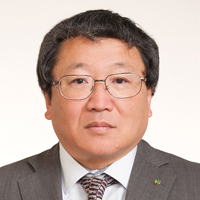
Takakazu Yumoto
Professor, Primate Research Institute, Kyoto University
- Web Site URL
- http://www.pri.kyoto-u.ac.jp/sections/ecolcons/yumoto/index-e.htm
- A brief Biography
-
1987 Ph. D in Graduate School of Science, Kyoto University 1987 – 1989 Research Fellow, JSPS 1989 – 1992 Assistant Professor, College for Liberal Arts, Kobe University 1992 – 1994 Lecturer, Faculty of Science, Kobe University 1994 – 2003 Associate Professor, Center for Ecological Research, Kyoto University 2003 – 2012 Professor, Research Institute for Humanity and Nature 2008 – 2012 Program Director, Research Institute for Humanity and Nature 2012 – Professor, Primate Research Institute, Kyoto University 2015 – Vice-director, Primate Research Institute, Kyoto University - A list of selected Publications
-
1) Yumoto T, Terakawa M, Terada S, Boupoya A, Nzabi T (2015) Species composition of a middle altitude forest in Moukalaba-Doudou National Park, Gabon. Tropics 23: 205-213.
2) Yumoto T, Iwata Y, Morimoto Y (2013) Evaluating cultural value of Satoyama using the preference method. Global Environment Research 17(2): 105-117.
3) Tsujino R, Yumoto T (2013) Vascular plant species richness along environmental gradients in a cool temperate to sub-alpine mountainous zone in central Japan. Journal of Plant Research 126: 2-3-214.
4) Yumoto T (2012) Human-environment interaction and climate in the Japanese Archipelago. PAGES News 20 (2): 84-85.
5) Yumoto T (2012) Why is satoyama and satoumi a concern? In: Satoyama- Satoumi Ecosystems and Human Well-Being (Anantha KD, Nakamura K, Takeuchi K, Watanabe M, Nishi M Eds.) pp. 125-154.
6) Hosaka T, Yumoto T, Chen YY, Sun IF, Wright SJ, Md Noor NS (2011) Abundance of insect seed predators and intensity of seed predation on Shorea (Dipterocarpaceae) in two consecutive masting events in Peninsular Malaysia. Journal of Tropical Ecology 27: 651-655.
7) Kusaka S, Nakano T, Yumoto T, Nakatsukasa M (2011) Strontium isotope evidence of migration and diet in relation to ritual tooth ablation: a case study from Inariyama Jomon site, Japan. Journal of Archaeological Science 38: 166-174.
8) Yumoto T (2011) Historical perspectives on the relationships between humanity and nature in Japan. In: Landscape Ecology in Asian Culture (Hong SK, Wu J, Kim JE, Nakagoshi N Eds.) pp. 3-10. Springer.
9) Yumoto, T., Uesedo, Y. (2011) A future for tradition: cultural preservation and transmission on Taketomi Island, Okinawa, Japan. In: Island Futures (Baldacchino G, Niles D Eds.) pp. 139-152. Springer.
10) Kusaka S, Hyodo F, Yumoto T, Nakatsukasa M (2010) Carbon and nitrogen analysis on the diet of Jomon populations from two coastal regions of Japan. Journal of Archaeological Science 37: 1968-1977.
11) Kawase D, Hayashi K, Takeuchi Y, Yumoto T (2010) Population genetic structure of Lilium japonicum and serpentine plant Lilium japonicum var. abeanum by using developed microsatellite DNA polymorphism marker. Plant Biosystems 144: 29-37.
12) Tsujino R, Ishimaru E, Yumoto T (2010) Distribution patterns of five mammals in the Jomon period, middle Edo period, and the present, in the Japanese Archipelago. Mammal Study 35: 179-189.
13) Hosaka T, Yumoto T, Kojima H, Komai F, Md Noor NS (2009) Community structure of pre-dispersal seed predatory insects on eleven Shorea (Dipterocarpaceae) species. Journal of Tropical Ecology 25: 625-636
14) Terakawa M, Isagi Y, Matsui K, Yumoto T (2009) Microsatellite analysis of the maternal origin of Myrica rubra seeds in the feces of Japanese macaques. Ecological Research 25: 663-670.
15) Tsujino R, Yumoto T (2009) Topography-specific seed dispersal by Japanese macaques in a lowland forest on Yakushima Island, Japan. Journal of Animal Ecology 78: 119-125.
Program Chair for the Category of Arts and Philosophy
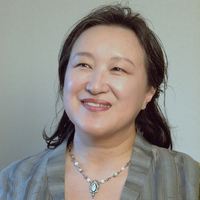
Shoko Suzuki
Professor, Graduate School of Education, Kyoto University
- Web Site URL
- http://www.educ.kyoto-u.ac.jp/shoko/
- A brief Biography
-
Shoko Suzuki, Dr. Phil., is Professor at Graduate School of Education, Kyoto University in Japan. Dr. Suzuki is also a member of the Science Council of Japan, the Board of Education in Kyoto and the Board of Directors of the Japanese Society for the Philosophy of Education. She was the academic leader of a program in Kyoto University’s Global Center of Excellence, titled “Revitalizing Education for Dynamic Hearts and Minds (2007-2012)”. Prior to that, Dr. Suzuki was involved in research activities at the University of Cologne, Germany from 1982 to 1989 and enjoyed a guest professorship at the Free University of Berlin, Germany from 2009 to 2010.
- A list of selected Publications
-
1) Suzuki, Shoko(2014): Ernährungspädagogik in Japan. In: Althans, B./ Schmidt, F./ Wulf, Chr.: Nahrung als Bildung. Interdisziplinäre Perspektiven auf einen anthropologischen Zusammenhang, Beltz Juventa; Weinheim/Basel 2014, S.128-138.
2) Suzuki(2014): Takt, in: Chr.Wulf / J. Zirfas (Hrsg.): Handbuch Pädagogische Anthropologie, Wiesbaden S. 295-304.
3) Suzuki, S. / Wulf, Ch. (2013): Auf dem Weg des Lebens – West- östliche Meditation. Logos Verlag; Berlin.
4) Suzuki, S. (2013): Wisdom on the Pursuit of Happiness in Daily Life: Christmas Celebration in the German Family, Klien, S./ Wulf, Chr.(Hrsg.) Paragrana- Internationale Zeitschrift für Historische Anthropologie, Band 22, Heft1: Well-Being – Emotions, Rituals, and Performances in Japan, P.235-248.
5) Suzuki, Shoko (2012): ‚The Kyoto School and J.F.Herbart‘. In: P. Standish, /N. Saito, (ed.): Education and the Kyoto School of Philosophy. Pedagogy for Human Transformation, Heidelberg/New York/London, P.41-53.
6) Suzuki, S./ Wulf, Chr. u. anderen (2011):Glück der der Familie. Wiesbaden; VS Verlag für Sozialwissenschaften; Wiesbaden.
7) Suzuki, S. (2010): Sein und Werden – Poiesis in Gesten, in: Wulf Chr./ Fischer-Lichte, E. (Hrsg.): Geste, Wilhelm Fink, S. 116-122.
8) Suzuki, S. (2010): Takt in Modern Education. Münster/New York; Waxmann
9) Suzuki, S. (2008): Die Zukunft verhandeln. Aus der Sicht der Wissenschafts-kommunikation in der Risikoforschung und Bioethik Japans, in: Paragrana-Internationale Zeitschrift für Historische Anthropologie. Bd.17: Das Menschliche Leben, S.187-194.
10) Suzuki, S . (2008): Takt als Medium, in: Paragrana- Internationale Zeitschrift für Historische Anthropologie, Bd.16, S. 145-167.
11) Suzuki, S./ Wulf, Chr. (ed.) (2007): Mimesis/ Poiesis/ Performativity. Münster/New York; Waxmann.
12) Suzuki, S., (2007): Über die ‘Musse’ aus japanischer Sicht, in: Paragrana- Internationale Zeitschrift für Historische Anthropologie(Akademie Verlag),Band 15, S.114-124,
13) Suzuki, S.(2007): Brush Calligraphy. Mimesis and Poiesis in Rinsho. Imai,Y. /Wulf, Chr.(eds.), “Concepts of Aesthetic Education. Japanese and European Perspektives”, Waxmann, pp.149-161.
Program Chair for the Field of Music
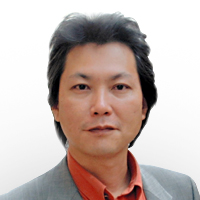
Akeo Okada
Professor, Institute for Research in Humanities, Kyoto University
- A brief Biography
- Akeo OKADA (born in 1960) is professor for musicology at the Kyoto University (Institute for humanities). He studied musicology in Osaka, Munich and Freiburg i.Br. He received his Ph.D. with a dissertation on Richard Strauss’s Rosenkavalier. He has engaged with the European music in the 19.century, especially grand opera and piano music. He has published books on the History of Western Music, Operas of Mozart, Music during the First World War, Music Life in Vienna around the turn of the century and others. He was awarded with Suntory Prize for Social Sciences and Humanities, Yoshida Prize for Music Critique and Prize for Art Promotion (Japanese Agency for Cultural Affairs). His book on the History of Western Music is published also in Korea. He is the organizer of the First World War Research Project at the Kyoto University since 2007.
- Details of selected Awards and Honors
-
Suntory Prize for Social Sciences and Humanities
Yoshida Prize for Music Critique
Prize for Art Promotion (Japanese Agency for Cultural Affairs)
- A list of selected Publications
-
・”Europaische Klassik in Japan – Eine düstere Diagnose”
(Silvain Guignard (ed.), Musik in Japan, München: Indicium Verlag, Jan. 1996,pp.179-198)・”Zwischen Musik und Drama – Traditionelle Operndramaturgie in der Literaturoper”
(AESTHETICS Nr.7, May 1996,pp.121-128).・”Oper aus dem Geist der symphonischen Dichtung. Über das Formproblem in den Opern von Richard Strauss”
(Archiv für Musikwissenschaft LIII-3, Aug. 1996,pp.234-252).・”Vorgeschichte des Octavian-Motivs – eine Untersuchung der Skizzenbücher von Richard Strauss zum Rosenkavalier″
(Hermann Danuser (ed.), Musik als Text. Bericht über den Internationalen Kongress der Gesellschaft für Musikforschung Freiburg in Breisgau 1993, Kassel: Barenreiter Verlag, Apr. 1999,pp.476-479).・Imaginary Song of the West: Ryuichi Sakamoto, Masahiro Miwa and the Music of Postmodern Japan, in: Contemporary music in East Asia (ed. by Hee Sook Oh), Seoul National University Press 2014, p.153-166.
・Reduktion, Repetition und Verstärkerung ― Klavierübungen und musikalisches Denken des 19.Jahrhunderts, in: Verkörperungen der Musik. Interdisziplinäre Betrachtung(ed.by Jörn Peter Hiekel and Wolfgang Lessing), Bielefeld: Transcript Verlag 2014.
・The First World War. A Trans-Disciplinary Study, in: The World during the First World War (ed.by Helmut Bley and Anorthe Kremers), Essen: Klartext 2014, p.369-371
Collaboration for Program Chair for the Field of Music
Joint Research Group “What is the Contemporary World?”
Institute for Research in Humanities, Kyoto University
Secretariat of Symposium
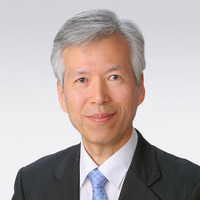
Susumu Yoshida
Specially Appointed Professor, Professor Emeritus, Kyoto University
- A brief Biography
- He was engaged in the education and research of information and communication engineering for 40 years in Kyoto University until his retirement in March 2013. Since October 2013, he has been with the Office of the President, Kyoto University. He has also been serving as council members of Science Council of Japan and Radio Regulatory Council of Ministry of Internal Affairs and Communications.
- Details of selected Awards and Honors
-
2007 Ericsson Telecommunications Award 2011 Radio Day Ministerial Commendations, Ministry of Internal Affairs and Communications 2013 Okawa Prize 2014 Distinguished Achievement and Contributions Award, Institute of Electronics, Information and Communication Engineers - A list of selected Publications
-
(1) J.X. Yu, Y. Li, H. Murata and S. Yoshida,
“Hybrid-ARQ Scheme Using Different TCM for Retransmission”,
IEEE Trans. Communications, vol.48, no.10, pp. 1609-1613, Oct. 2000.(2) K. Yamamoto and S. Yoshida,
“Tradeoff between area spectral efficiency and end-to-end throughput in rate-adaptive multihop radio networks”,
IEICE Trans. Communications, vol.E88-B, no.9, pp.3532-3540, Sept. 2005.(3) S. Kucera, S. Aissa and S. Yoshida,
“Adaptive channel allocation for enabling target SINR achievability in power-controlled wireless networks”,
IEEE Trans. Wireless Communications, vol.9, no. 2, pp.833-843, Feb. 2010(4) H. Murata, S. Yoshida, K. Yamamoto, D. Umehara, S. Denno, M. Morikura,
“Software radio-based distributed multi-user MIMO testbed: Towards green wireless communications”,
IEICE Trans. Fundamentals, vol.E96-A, no.1, pp.247-254, Jan. 2013.









